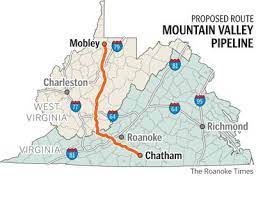 WV environmental groups press case challenging DEP water quality certification for Mountain Valley Pipeline
WV environmental groups press case challenging DEP water quality certification for Mountain Valley Pipeline
From an Article by Mike Tony, Charleston Gazette, WV, October 20, 2022
(Pictured was a photo of what environmental group attorneys told a federal court was sediment-laden water discharging from the outlet end of a culvert in Wetzel County that resulted in state environmental regulators citing Mountain Valley Pipeline for violating water quality standards.)
West Virginia environmental groups say they’ve got proof that state regulators erred in predicting the Mountain Valley Pipeline wouldn’t violate state water quality standards in their determination to grant the project a key approval last year. The groups say the proof comes from the West Virginia Department of Environmental Protection itself.
In the groups’ latest filing in their case challenging the DEP’s water quality certification issued to project developer Mountain Valley Pipeline LLC, the groups pointed to the agency’s August citation of the company for violating water pollution control permit standards. The DEP found that Mountain Valley discharged sediment-laden water offsite which flowed downslope and entered a Stout Run tributary in Wetzel County. The agency also cited the company for failing to filter sediment out of water being evacuated from a pipe trench.
The groups argued that the August notice of violation “establishes the falsity of” the DEP’s prediction that Mountain Valley would comply with water quality standards after applying for the water quality certification despite a history of water quality violations.
The DEP fined Mountain Valley a combined $569,000 in 2019 and 2021 for erosion and sedimentation issues. The Virginia Department of Environmental Quality fined Mountain Valley $2.15 million in 2019, resolving a lawsuit the agency and former Virginia Attorney General Mark Herring filed alleging the company violated a previously issued water quality certification by not controlling sediment and stormwater runoff.
Representing the DEP, the Attorney General’s Office noted the agency’s prediction that Mountain Valley would comply with water quality standards “going forward” from the agency’s decision to grant the water quality certification under the federal Clean Water Act in a brief it filed in the case in June. “An agency is not bound to reject an applicant with some prior non-compliance,” the agency argued in the June filing, saying it “employed reasonable understandings of state water-quality standards” to determine it should grant the water quality certification to Mountain Valley.
The agency granted the certification on Dec. 30 to Mountain Valley, the joint venture that owns the pipeline, after determining that project upland and water crossing activities would avoid lowering water quality from sediment pollution and thus comply with state water quality requirements.
The DEP acknowledged that the 42-inch-diameter pipeline is slated to result in permanent impacts to 1,276 linear feet of streams and nearly half an acre of wetlands, and temporary impacts to 20,868 linear feet of streams and nearly 12 acres of wetlands. The temporary impacts were to stem from the excavation and backfilling of pipeline trench as the project crossed wetlands and streams.
The Mountain Valley Pipeline is slated to run from Northern West Virginia to Southern Virginia, crossing Wetzel, Harrison, Doddridge, Lewis, Braxton, Webster, Nicholas, Greenbrier, Fayette, Summers and Monroe counties in West Virginia.
The water quality certification was required to allow discharging dredged and fill material into some waterbodies. The U.S. Environmental Protection Agency has defined fill material to include rock, soil, clay, construction debris.
The DEP said upon granting the water quality certification that “there is no reasonable expectation that water quality will be degraded” where permanent fill material is placed in waters according to project plans. The Sierra Club, the West Virginia Rivers Coalition, the West Virginia Highlands Conservancy, the Indian Creek Watershed Association, Appalachian Voices and the Chesapeake Climate Action Network challenged the water quality certification in the U.S. Court of Appeals for the Fourth Circuit four days after the DEP issued it.
The groups have been represented by Lewisburg-based environmental law firm Appalachian Mountain Advocates. Oral arguments in the case begin Tuesday.
In a court filing Wednesday, a Mountain Valley attorney said the company corrected the DEP-cited deficiency by installing a new dewatering structure and trench culvert. Attorney George P. Sibley III, cited a letter from the project’s lead developer to the DEP earlier this month reporting corrective actions taken in response to the notice of violation. Sibley argued that the notice of violation “does not speak to the reasonableness of DEP’s prediction” that remaining Mountain Valley stream crossings would avoid violating water quality standards.
To Be Continued ….. See Part 2 tomorrow.
